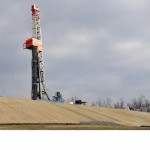GAS WELL FLARES
January 10, 2012U.S. Cuts Estimate for Marcellus Shale Gas Reserves by 66%
January 24, 2012
Times are tough in northeast Pennsylvania, where rural townships are nestled in the valleys of the Endless Mountains and the Poconos. The economic casualties include Exeter Township, a tiny community wedged between two mountains along the Susquehanna River with an unemployment rate that tops the national average.
Yet the allure of new jobs and a swift economic jolt from oil and gas companies aggressively seeking to tap the Marcellus Shale, a vast subterranean reservoir of natural gas that extends into Ohio, West Virginia, Virginia, Maryland and New York, isn’t swaying municipal officials to cede local jurisdiction to Harrisburg, no matter if it puts their re-elections in jeopardy.
Local control means “the freedom to amend and change things for your residents to protect them, and protect your town,” said Ben Gadomski, a township supervisor. He said he would support gas drilling if it’s conducted responsibly and local officials are ensured a role.
All five members of the township board of supervisors, along with officials from 29 other communities, signed a Dec. 12 letter to the Pennsylvania General Assembly urging state lawmakers not to impose “one-size-fits-all” regulation of hydraulic fracturing, or “fracking,” which enables the extraction of natural gas from otherwise hard-to-reach deposits deep underground.
“If I have my way, you’re going to interview to come in here and drill, and you’re going to be monitored,” Gadomski said.
“Or you’re not going to drill.”
Across Pennsylvania, a battle is being waged over how to regulate this modern-day gold rush. Some communities — such as Williamsport, the home to Little League Baseball that is 56 miles west of Exeter — have welcomed drillers to boost their economies. But dozens of others, spurred by worries about pollution and water contamination, are urging the state not to usurp their zoning and regulatory authority. Oil and gas companies back legislation pending in Harrisburg that would give the state exclusive jurisdiction over the drilling. State lawmakers are expected to vote on a final version soon after they reconvene tomorrow.
The showdown is spreading to other states. In New York, more than 50 communities have restricted fracking or plan to, according to the Community Environmental Legal Defense Fund, as state officials decide whether to allow it. This month, West Virginia passed legislation to regulate fracking that critics deride as too industry-friendly, while authorities with the Delaware River Basin Commission will decide whether fracking should be permitted near a watershed that serves 15 million Americans. At stake are the hundreds of thousands of new jobs and billions of dollars in economic activity projected to result from harnessing the shale.
Critics point to places like Dimock, Pa., where Cabot Oil and Gas was forced by the state to pay $4.1 million to residents whose drinking water was so contaminated that they could light it on fire. While the industry insists that Dimock is an isolated case, and the company denies wrongdoing, it’s a cautionary tale for places like Exeter, where residents also rely on wells. “If something happens and it gets in that water, I’m screwed,” said Donald Hoffman, who left office in early January as township board chairman after he failed to win re-election. He said it was not related to his position on fracking.
Eight Pennsylvania communities, including Pittsburgh and State College, have banned fracking entirely, while others have sought to restrict it through ordinances. In November 2010, South Fayette Township, a Pittsburgh suburb, barred drilling near homes, parks and golf courses, drawing a legal challenge from Fort Worth, Texas-based Range Resources that remains pending. Township Commissioner Deron Gabriel said local authorities mobilized after learning that a gas company had secretly leased land near a school. “We don’t want to see our whole township industrialized,” he said. “We just knew we had to take some action.”
Demands for local input are fueled by advocacy groups worried about problems ranging from pollution to well blowouts to country roads clogged with big rigs. “Each municipality is unique in its own way” and knows what’s best for its community, emphasized Steve Hvozdovich, Marcellus campaign coordinator with Clean Water Action in Pittsburgh.
David Masur, director of PennEnvironment, warned that the legislation as presently crafted would permit drilling in residential areas, with towns helpless to intervene. “The industry wants carte blanche to override all local control,” he said. “We think that’s a bad idea.” Even where there’s no fracking, concerns run strong about related activity. In Dallas Township, near Gadomski’s community, there’s controversy over plans to locate a gas pipeline near a school.
“These are highly technical issues,” countered Patrick Creighton, a spokesman for the Marcellus Shale Coalition, an industry group. “It’s best placed in a statewide framework.” He contends that a patchwork of varying local ordinances would create bureaucracy and uncertainty that would undermine safety and environmental protections.
“The professionals in Harrisburg who regulate this industry are best equipped to develop a set of uniform standards across the board,” he argued. Creighton cited polling data indicating that most Americans support fracking.
Gadomski, however, worries that state regulation would miss the mark. “There’s a lot you gotta pay attention to with these guys because they’ll come in and devastate an area, and then leave.”


